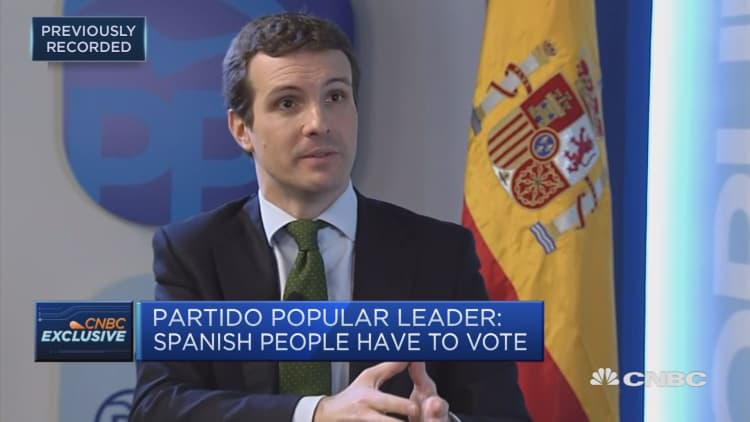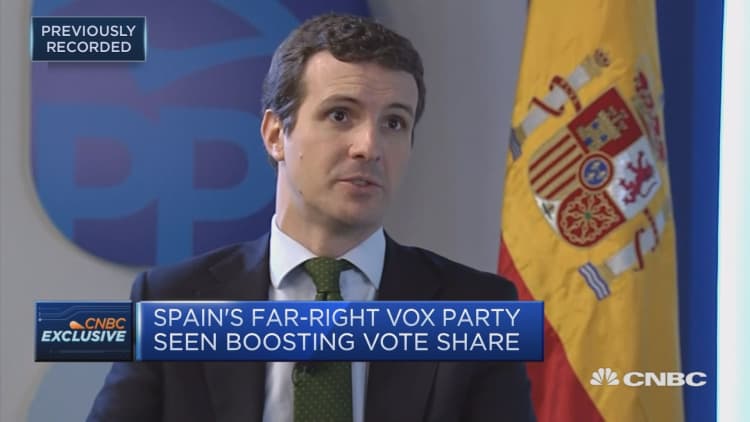
Spain's incumbent socialist government was "irresponsible" to negotiate with Catalonia's pro-independence parties, the president and leader of Spain's opposition People's Party (Partido Popular) told CNBC.
"This (socialist) government has tried to negotiate with those that want to divide our own nation," Pablo Casado told CNBC's Willem Marx in Madrid Thursday.
Casado said that Prime Minister Pedro Sanchez had been "irresponsible" to accept the support from secessionist parties that wanted to "break the unity of Spain" and that a PP-led government, should the party win a forthcoming general election, would not allow Spain to be divided.
"What we want to do if we win the election in April is to make clear that in Spain, as in all the modern democratic countries in the world, we are going to make sure everyone accomplishes with (the use of) law," he said.
Casado's criticism of the government comes as Spain's main political parties have swung into campaign mode ahead of a snap election in late April. The vote comes after lawmakers in Europe's fourth largest economy failed to agree on a draft budget plan last week.
Opposition parties Ciudadanos (Citizens Party) and the PP, as well as pro-independence parties in Catalonia, rejected the socialist government's national budget last week, prompting Prime Minister Pedro Sanchez to call the snap vote – Spain's third general election in four years - for April 28.
Sanchez's socialist party relied on votes from Catalan secessionists and the anti-austerity party Podemos to win a vote of no-confidence it tabled in June 2018 against the then PP-led government of Mariano Rajoy that had been wracked with a corruption scandal.
Since coming to power eight months ago, Sanchez's government has had to rely on the support of smaller and regional parties. Fears that he could make too many concessions to secessionists came to the fore in recent weeks after Catalan parties blocked the budget bill and demanded talks over independence.
When the government appointed a mediator for those talks it was accused of treachery and opposition parties staged a large protest in Madrid.
Widespread opposition to Catalan independence outside the north-eastern region could prove a boon in the election to opposition parties like the PP, and experts are predicting a right-wing coalition could take power.

The economy
Political turbulence in Spain comes at a time of uncertainty for the country's economy and the wider region. The European Commission's latest forecasts predict a mild deceleration of growth in Spain, the economy forecast to grow 2.1 percent in 2019 and 1.9 percent in 2020.
The commission said the moderation would be driven by a slowdown in private consumption. It noted, however, that the unemployment rate was still expected to decline from its current level of 14.3 percent (in December), the second highest rate in the EU after Greece.
Casado told CNBC that his party's economic plans would give Spain's economy credibility among international investors.
"The economy had a great time when we were in office …The problem right now though is not only what is going on with Brexit, with Italy and also with the U.S. and China but that all the measures over the last eight months that the government has announced."
Casado criticized policies introduced by the socialist-led government over the last eight months, including its decision to increase the minimum wage and taxes for higher earners and companies. The PP has said that it would lower income tax to below 40 percent and corporation tax to under 20 percent.
"All the international investors and also the Spanish companies have started to slow down their plans so we want to lower those taxes and just take out others," he said, adding that a PP-led government would seek to attract investors to Spain to create a technical hub in the country, improve its education system and to streamline its government.


